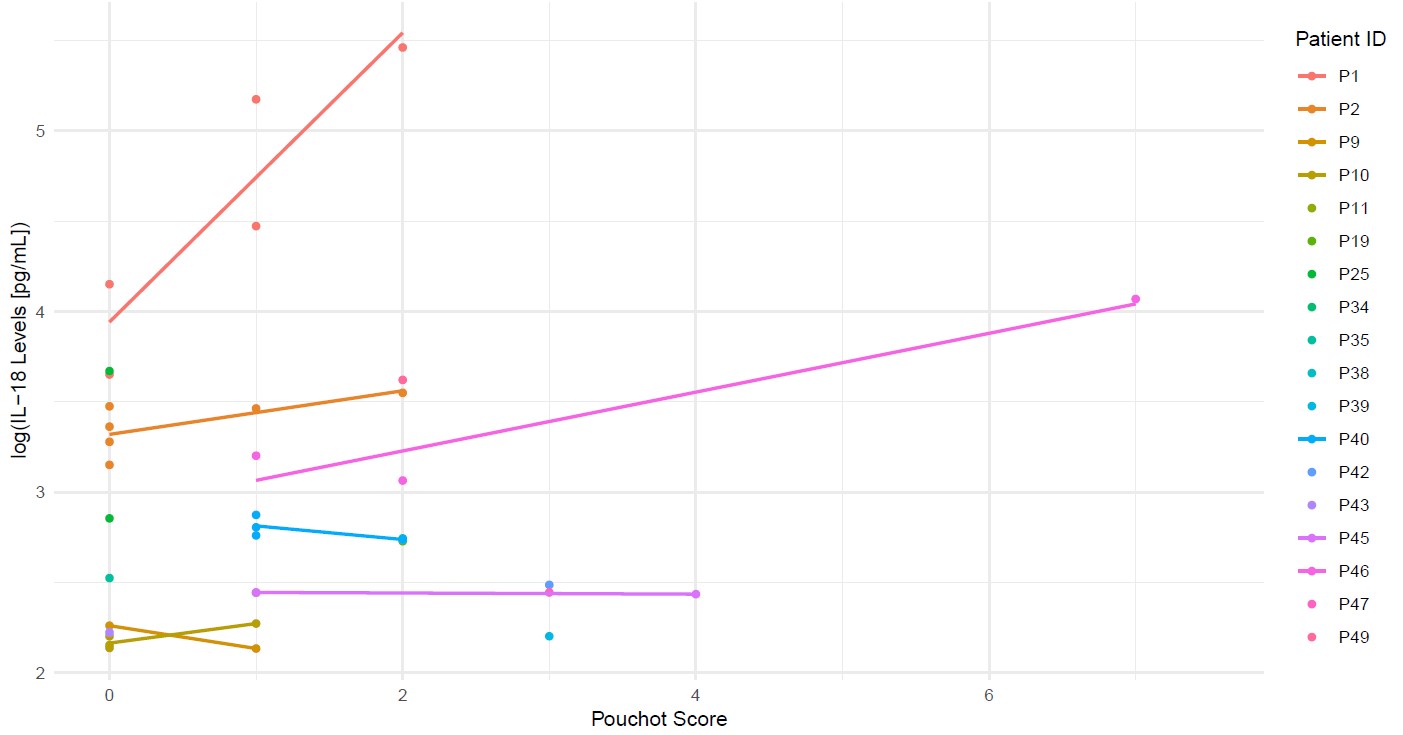Session Information
Date: Monday, October 27, 2025
Title: (1147–1190) Miscellaneous Rheumatic & Inflammatory Diseases Poster II
Session Type: Poster Session B
Session Time: 10:30AM-12:30PM
Background/Purpose: Adult-Onset Still’s Disease (AOSD) is a rare systemic inflammatory disease. Interleukin-18 (IL-18) levels are significantly elevated in AOSD patients¹ and may be a promising indicator of disease activity and potential target for therapeutics. The Pouchot systemic score, used to evaluate disease activity, assigns 1 point to each: fever, rash, pleuritis, pneumonia, pericarditis, hepatomegaly, splenomegaly, lymphadenopathy, leukocytosis ( >15,000/μL), sore throat, myalgia, and abdominal pain. The modified Pouchot (mPochout) score replaces splenomegaly and myalgia with arthralgia and hyperferritinemia ( >3000 μg/L). We evaluated the association between serum IL-18 levels and disease activity as measured by Pouchot scores in patients with AOSD to assess the potential of IL-18 as a biomarker.
Methods: Patients were identified by ICD-10 codes, and diagnoses were confirmed by their treating rheumatologist and via chart review by rheumatologists. Pouchot/mPouchot scores were calculated from the same day IL-18 labs were checked. We used linear mixed-effects models to assess the association between log-transformed IL-18 levels and clinical/serologic markers of disease activity, including Pouchot/mPouchot score, erythrocyte sedimentation rate (ESR), C-reactive protein (CRP), and ferritin. Patient ID was included as a random effect to account for repeated measures. Fixed effects included the independent variable of interest (e.g., Pouchot score), with IL-18 as the dependent variable. We also measured intraclass correlation coefficients (ICC).
Results: Of the Pouchot score symptoms, arthritis was the most common, followed by hepatomegaly, myalgia, rash, and fever. The mean Pouchot score, mPouchot score, and IL-18 level across all visits were 1.2, 1.7, and 14041.8 pg/mL respectively. Pouchot scores, ESR levels, and ferritin levels showed significant positive associations with IL-18 levels: (p< 0.01, p < 0.05, p < 0.001). The association between mPouchot scores or CRP with IL-18 levels were not statistically significant. ICC for the Pouchot, mPouchot, ESR, CRP, and Ferritin models ranged from 0.75-0.84 across models thus indicating 75-84% of variability in IL-18 levels was due to between-subject differences, while 16-25% was due to within-subject variability.
Conclusion: These findings suggest the potential utility of IL-18 as a biomarker for disease monitoring in AOSD, particularly in combination with clinical activity scores such as the Pouchot score, given its strong association with disease activity markers and its stable inter-individual variability over time. Given newer potential therapeutics in AOSD, regular IL-18 and disease activity monitoring may be useful in management of these patients.1. Colafrancesco et al. IL-18 Serum Level in Adult Onset Still’s Disease: A Marker of Disease Activity. PMID: 22762008.
 Table 1. Demographic and Clinical Characteristics
Table 1. Demographic and Clinical Characteristics
.jpg) Table 2. Results of Linear Mixed-Effects Models Assessing the Association Between Disease Activity and Inflammatory Markers with Log-Transformed IL-18 Levels
Table 2. Results of Linear Mixed-Effects Models Assessing the Association Between Disease Activity and Inflammatory Markers with Log-Transformed IL-18 Levels
.jpg) Figure 1: Log-Transformed IL-18 Levels vs Pouchot Score. Data points represent individual visits during which IL-18 levels were checked and Pouchot scores were calculated; different colors correspond to different patients. A line of best fit was constructed for patients that were tested more than once. Higher Pouchot scores indicate more severe disease activity.
Figure 1: Log-Transformed IL-18 Levels vs Pouchot Score. Data points represent individual visits during which IL-18 levels were checked and Pouchot scores were calculated; different colors correspond to different patients. A line of best fit was constructed for patients that were tested more than once. Higher Pouchot scores indicate more severe disease activity.
To cite this abstract in AMA style:
Abdul-Rehman H, Gambina K, Mehta B. IL-18 Correlates with Pouchot Score and Inflammatory Biomarkers in Adult-Onset Still’s Disease: Insights From a Repeated Measures Study [abstract]. Arthritis Rheumatol. 2025; 77 (suppl 9). https://acrabstracts.org/abstract/il-18-correlates-with-pouchot-score-and-inflammatory-biomarkers-in-adult-onset-stills-disease-insights-from-a-repeated-measures-study/. Accessed .« Back to ACR Convergence 2025
ACR Meeting Abstracts - https://acrabstracts.org/abstract/il-18-correlates-with-pouchot-score-and-inflammatory-biomarkers-in-adult-onset-stills-disease-insights-from-a-repeated-measures-study/
